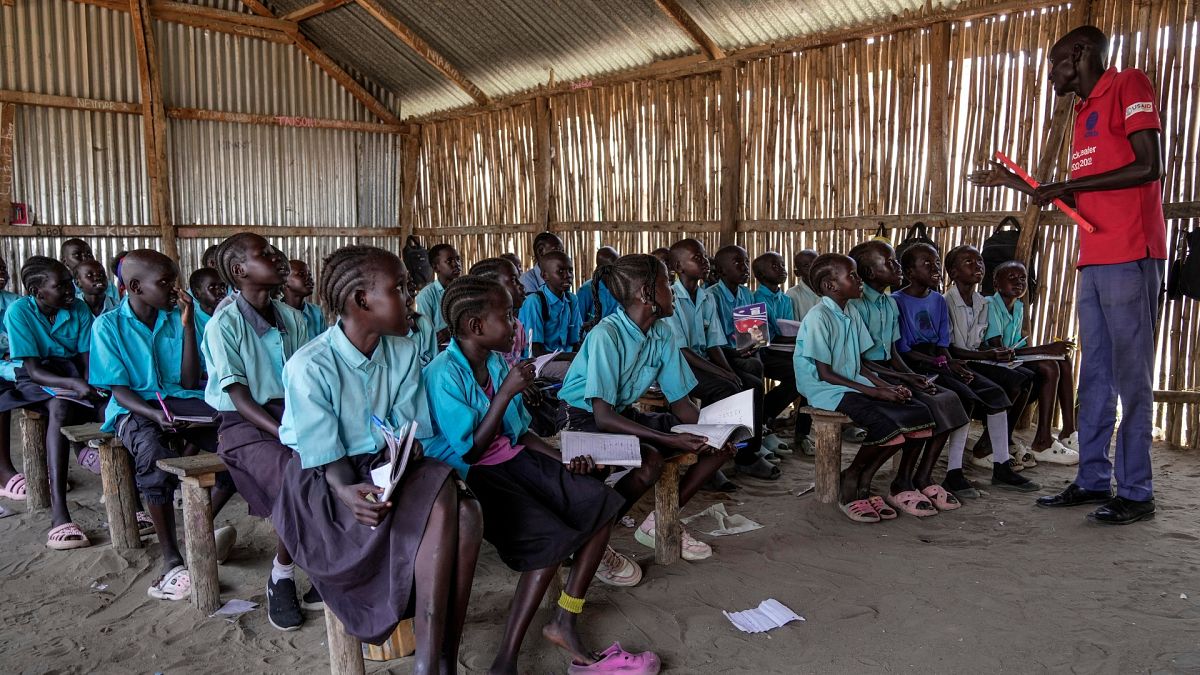Many schools in South Sudan have makeshift structures and no electricity for cooling systems.
South Sudan closed all schools Thursday for two weeks due to an extreme heat wave that has caused some students to collapse.
This is the second time the country – which faces extreme effects from climate change, including flooding during the rainy season – has closed schools during a heat wave in February and March.
Deputy Education Minister Martin Tako Moi said “an average of 12 students had been collapsing in Juba city every day.”
Environment Minister Josephine Napwon Cosmos urged residents to stay indoors and drink water as temperatures were expected to rise as high as 42 degrees Celsius.
Napwon proposed that government employees “work in shifts” to avoid heat strokes.
Children are particularly vulnerable to dangerous heat
Most schools in South Sudan have makeshift structures made with iron sheets and do not have electricity that could power cooling systems.
“Dangerous heat like this is catastrophic for children’s physical and mental health,” says Christopher Nyamandi, Country Director for Save the Children in South Sudan.
“Because their bodies are still developing, they are more vulnerable to both immediate illness and lasting long-term harms that come with the intense discomfort, sleeplessness, and exhaustion we are more familiar with. ”
Education workers have urged the government to consider amending the school calendar so that schools close in February and resume in April when the temperatures decline.
Abraham Kuol Nyuon, the dean of the Graduate College at the University of Juba, told The Associated Press that the calendar should be localised based on the weather in the 10 states.
South Sudan has one of the highest rates of out-of-school children
A civil society group, Integrity South Sudan, blamed the government for a lack of proper planning and contingency plans, saying that closing schools during heat waves shows a “failure to prioritise the education of South Sudan’s children.”
Nyamandi adds that shutting classroom doors often means “shutting the door to a stable and healthy future”. The longer children are out of school the less likely it is that they will go back.
“South Sudan already has one of the highest rates of out-of-school children in the world. It is abominable that children already bearing the brunt of poverty and inequality, who have done absolutely nothing to contribute to rising temperatures, are robbed of their basic rights,” he says.
“When we talk about climate justice, this is what we mean. It is time for global recognition that the climate crisis is a child rights crisis and that we need an urgent response that centres children’s rights, lives and wellbeing.”
The country’s health system is fragile due to political instability. Nearly 400,000 people were killed between 2013 and 2018 when a peace agreement was signed by President Salva Kiir and his rival-turned-deputy, Riek Machar.
South Sudan’s elections, scheduled for last year, were postponed for two years due to a lack of funds.
The country has been facing an economic crisis due to an interruption of oil exports after a major pipeline was raptured in neighbouring war-torn Sudan. The pipeline was later repaired.

